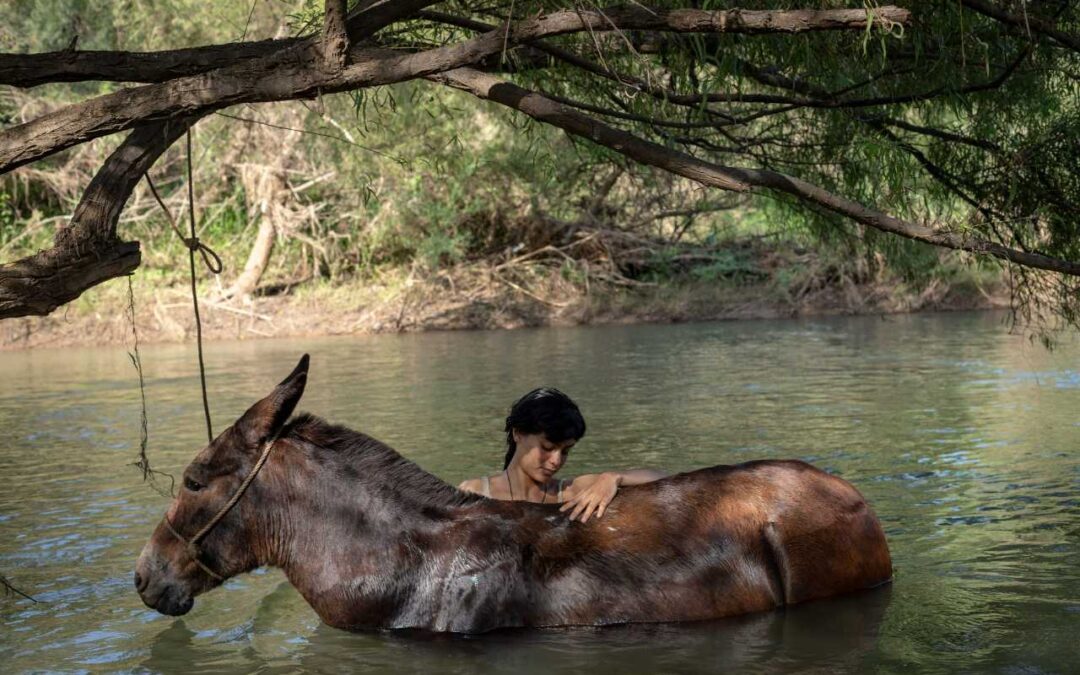The 2024 Guadalajara International Film Festival held in Los Angeles earlier this month featured the from the Festival Internacional de Cine en Guadalajara (FICG), “La Arriera,” (the muleteer) which earned Isabel Cristina Fregoso a Best Director award. Since June after the world premiere, the film has gone on to be an official selection in various film festivals across the United States, including the most recent at the Portland Latin American Film Festival also this month.
Of note when I was doing some research on this film, I found a link to a social media post, dated September 16th from a page for filmmaker Sam Peckinpah, with the following about the film. “It was an official selection at this year’s 2nd annual FICPBA Film Festival in Buenos Aires, where Sam’s daughter Lupita Peckinpah just won an award for the film’s costume design.” Indeed, on IMDb, she is listed as the Costume Designer. Since the film begins in 1917, then moves ahead to the early 1903s, the costumes are lovely and appear authentic for the timeframe in Mexico. A look at the poster for the film shows the protagonist in the clothing designed for the film and provides an example of the designer’s work.
About the film: In the mountains of Jalisco at the beginning of the 20th century, Emilia’s desire to explore leads her to run away from her adoptive family in search of her biological father. Posing as a young muleteer, she crosses the mountains on horseback to reach the sea. This journey makes her discover a different world that will lead her to take control of her own destiny. [Glaff.org]
The director co-wrote the script with Alfonso Suárez, a historical drama that is in Spanish and Wixárika with English subtitles. The film begins with the setting that establishes the place and time in 1917 when a young woman becomes pregnant and has a baby girl. Because of this situation, the healer/midwife tends to the child briefly until a married couple accept to raise her on their land. Fast forward into the 1930s in the highlands of Jalisco. The baby Emilia is now a teenager, performed by Andrea Aldana (Líneas de Falla, El sapo de cristal, Martinez).
Her adopted siblings, brother Martín (Luis Vegas (“El juego de las llaves” TV series, Demons at Dawn) and sister Caro (Ale Cosio, La Casa Azul) are close in age. There is strict upbringing where Martin is to be the man of the house when the father is away, so he clearly has an attitude when Emilia shows her strength working and riding the horses. He does not approve of her wanting to and able to be carrying out “manly” duties on the massive property. (If I recall, everyone had to pull their weight on a family farm when needed, even if it appears to be the more “manly” work.) Despite this, the three teens (at different times) find their ways to explore what their hormones may be leading them to without any formal sex-ed as it would be considered today. Ultimately, Emilia and Martin have a clash of what is proper, etc. and this sparks Emilia’s escape to find her freedom, and perhaps her biological father.
This is a great script and with the vision of the director, this film is certainly one that I hope does have a theatrical release, and/or is made available for more individuals to watch. The cinematography by María Sarasvati Herrera and the score by Carlos Vertiz and Héctor Ruiz enhance the action in the film and of course the more quiet and intimate moments of life and what it can be.
Additional crew: Sound – Lena Esquenazi, Valeria Mancheva, Production Design – José Portillo, Editor – Martha Uc, Producer – Edher Campos, Regina Vergara Perezcastro.
About the Director – Isabel Cristina Fregoso: Graduate of the Escuela Nacional de Artes Cinematográficas and a bachelor’s in communications from ITESO University. She is a member of the AMACC (Mexican Academy of Cinematographic Arts and Sciences).
As a director and writer, she has participated in several labs such as Cine Qua Non, Toscano Foundation, and Sundance Film Institute for writers, as well as Bolivia Lab.
Her films and short films: Chenalhó, el corazón de los altos, El aliento de Dios, Cristeros y Federales, La Polveada, and Cultiva Ciudad, can be seen on Nuestro CineMx, the streaming platform of IMCINE.
Source: GLAFF, IMDb
###

